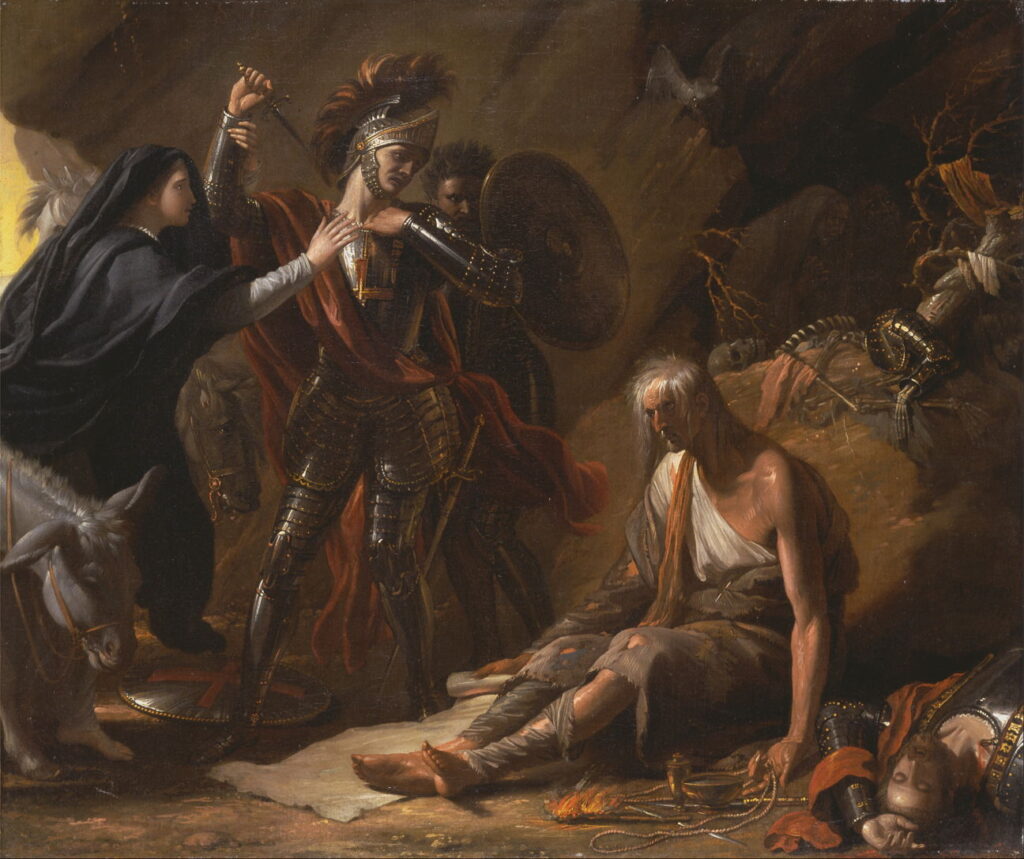Spiritual Sunday
I realize that I have not reported on my Lenten reading project, which was to read as much as I could of Edmund Spenser’s Faerie Queene. As it turned out, I only got through Book I and those parts of Books II and III that are in the Norton Anthology. Nevertheless, it proved to be a rich experience, especially when I realized how much C.S Lewis owes to the poem for his Narnia books. More on that in a future post.
Since I was reading the poem for Lenten observance, one thing that stood out was how the Redcrosse Knight—a St. George figure—does penance. I’ve been arguing in some of my Lenten posts that Lent is not a time to beat yourself up for how bad you’ve been but a time to get closer to God. At one point I shared a Madeleine L’Engle poem that opens, “It is my Lent to break my Lent, /To eat when I would fast.” In other words, she’s not going to observe Lent by mortifying her body, which she sees as counterproductive. Rather, she will observe it by attempting to follow Christ’s Sermon on the Mount instructions.
The vision of Lent she’s pushing against, however, is the one that Redcrosse observes, with hot sauce added. In the poem, he has just been rescued from Despaire, where he almost commits suicide. As you read his cleansing ritual, don’t be daunted by the language—while it mimics Chaucer’s middle English, it’s actually closer to modern English, prettied up in the Spenserian style. Una, incidentally, is Redcrosse’s lady fair, who suffers as she witnesses his self-flagellation but nevertheless regards it as necessary:
Book I, XXVI
In ashes and sackcloth he did array
His daintie corse, proud humors to abate,
And dieted with fasting every day,
The swelling of his wounds to mitigate,
And made him pray both earely and eke late:
And ever as superfluous flesh did rot
Amendment readie still at hand did wayt,
To pluck it out with pincers firie whot
That soone in him was left no one corrupted jot.XXVII
And bitter Penance with an yron whip,
Was wont him once to disple every day:
And sharpe Remorse his hart did pricke and nip,
That drops of blood thence like a well did play:
And sad Repentance used to embay
His bodie in salt water smarting sore,
The filthy blots of sinne to wash away.
So in short space they did to health restore
The man that would not live, but earst lay at deathes dore.XXVIII
In which his torment often was so great,
That like a Lyon he would cry and rore,
And rend his flesh, and his owne synewes eat.
His owne deare Una hearing evermore
His ruefull shriekes and gronings, often tore
Her guiltlesse garments, and her golden heare,
For pitty of his paine and anguish sore;
Yet all with patience wisely she did beare;
For well she wist his crime could else be never cleare.
If that’s what it takes to become clear, sign me up for a different religion.
I don’t know a lot about either Faerie Queene or the Christianity of the time, but if fear of hell played a big role in it, then I can see why one might go overboard to make sure one didn’t go there. To end this post on a more cheerful note—one more in keeping with the Easter season—here’s one describing where Redcrosse hopes he ends up. Since in today’s lectionary readings we finish up the Book of Revelations, it’s more than appropriate. First, the lesson:
In the spirit the angel carried me away to a great, high mountain and showed me the holy city Jerusalem coming down out of heaven from God. I saw no temple in the city, for its temple is the Lord God the Almighty and the Lamb. And the city has no need of sun or moon to shine on it, for the glory of God is its light, and its lamp is the Lamb. The nations will walk by its light, and the kings of the earth will bring their glory into it. Its gates will never be shut by day– and there will be no night there. People will bring into it the glory and the honor of the nations.
And now for the vision of heaven that a holy hermit shows Redcrosse after he has completed his penance. Like Jacob, Redcrosse sees angels ascending and descending the stairway to heaven
Faire knight (quoth he) Hierusalem that is,
The new Hierusalem, that God has built
For those to dwell in, that are chosen his,
His chosen people purg’d from sinfull guil
With pretious blood, which cruelly was spilt
On cursed tree, of that unspotted lam,
That for the sinnes of al the world was kilt:
Now are they Saints all in that Citie sam,
More dear unto their God then younglings to their dam.
Emily Dickinson has written, Some keep the Sabbath going to Church –/ I keep it, staying at Home .” Yes, and some observe Lent by plying their flesh with whips while others with reading books. No ruefull shriekes and gronings for me, thank you very much. We can debate which way gets us closer to God.


